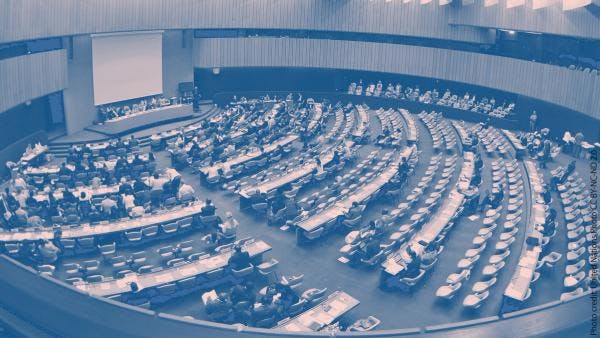United Nations Photo / Flickr / CC BY-NC-ND 2.0
Statement drafted at the occasion of the Consultations of the Committee on NGOs with NGOs in consultative status with ECOSOC
Below, we share the statement that IDPC intended to make in view of the consultation sessions with non-governmental organisations that were organised by the Committee on Non-Governmental Organizations of ECOSOC on 13 December 2022.
Unfortunately, the statement could not be delivered by our nominated representative, Benjamin Phillips, despite extensive exchanges with the NGO Branch of the United Nations Department of Economic and Social Affairs, UN DESA.
Our legitimate nomination, as an ECOSOC-accredited organisation with a solid track record of engagement with UN institutions, was rejected by UN DESA under spurious pretexts in relation to our representative's affiliation with other civil society organisations in the framework of his advocacy work at the UN level. We consider that these pretexts are inadmissible, as they insinuated an irregular situation where there was none. It is not unusual for colleagues from civil society organisations, who have limited resources but a keen sense of solidarity, to work together in advocacy spaces, including at the UN.
It has been brought to our attention that other colleagues representing ECOSOC-accredited organisations were also denied participation in these consultations on similar unduly-inflexible grounds.
We regret that this situation has obstructed the participation of a number of civil society organisations in consultations organised precisely to discuss questions of interest to the Committee and to our organisations relating to the relationship between the NGOs and the United Nations.
We will exhaust the necessary channels to ensure that this unnecessary and unfair obstruction is not repeated on future occasions.
Statement drafted at the occasion of the Consultations of the Committee on NGOs with NGOs in consultative status with ECOSOC
13 December 2022
I am making this statement on behalf of the International Drug Policy Consortium (IDPC), a global network of more than 190 NGOs that promote drug policies grounded in human rights and social justice.
This statement is endorsed by the Andrey Rylkov Foundation, the Centre for Drug Policy Evaluation, Correlation-European Harm Reduction Network, the Eurasian Harm Reduction Association, the Foreningen Tryggere Ruspolitik, the International Network of People who Use Drugs, Instituto RIA and Youth RISE. All of our organisations have a history of having been previously targeted by the UN Committee on NGOs or are particularly involved in advocating for change in the working practice of the Committee.
I take this opportunity to present research conducted by IDPC covering the period 2017 to 2021, which shows that NGOs working on drug-related issues are facing increasing difficulties in obtaining ECOSOC status because of problematic practices within the Committee on NGOs. We found that in those five years, the percentage of NGOs working on drugs which had been recommended for ECOSOC status had dropped from 74% in 2017 to just over half in 2021. For NGOs working specifically on drug policy reform and harm reduction, this percentage plummeted to only 11% in 2021. By the end of 2021, 17 NGOs working on drugs were still waiting to receive their ECOSOC status, 8 of which had undergone at least 4 rounds of questioning.
Our research shows that this trend can be explained by actions from a limited but vocal number of member states to defer applications by NGOs working on drugs by posing banal questions whenever their applications are considered by the Committee. Rather than seeking to gain valuable information about the work of these NGOs, posing these questions seems to be used as a strategy to impede access to ECOSOC status for those organisations.
Concerningly, these worrying practices mirror the closing space, lack of support, and sometimes harassment that many drug policy and harm reduction organisations face at the national level.
The difficulty in accessing ECOSOC status for these NGOs cannot be understated. It poses serious obstacles to their ability to engage meaningfully with the UN. Without these organisations, many indispensable voices are currently missing from UN debates and policymaking. This underscores the urgent need to reform the way the Committee on NGOs functions.
We therefore recommend the following:
- Firstly, that NGOs under review are able to engage in the interactive dialogue with the Committee on NGOs in a hybrid format, to avoid using valuable and scarce resources to travel all the way to New York whenever their applications are under review.
- Secondly, that NGOs receive a clear indication of the date and time when their application will come under review by the Committee on NGOs, in order for them to be able to follow the proceedings that concern them.
- Thirdly, that a public database be developed that includes all questions posed by each member state to NGOs, in order to ensure transparency and accountability in the proceedings.
- Fourthly, and importantly, that a limit be placed on the number of consecutive questions that can be asked to an NGO to avoid applications being deferred indefinitely by the Committee on NGOs.
- Five, that all Member States use ECOSOC to maintain oversight over the Committee on NGOs’ decisions and performance.
- And finally, that the NGOs be included in the membership of the Committee on NGOs itself.
Thank you very much for your attention and your ongoing support for civil society participation in UN proceedings.
